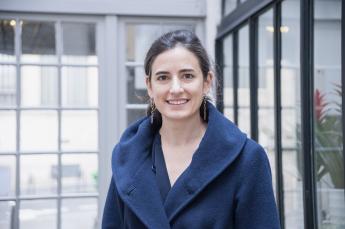
Creating a Research Community Around Medical and Economic Issues
Alexandra Roulet heads the Health Economics Initiative.

This associate professor in economics at the European Institute of Business Administration (INSEAD) is creating synergies between economic sciences and medical sciences.
How did this initiative come about?
Alexandra Roulet: We wanted to strengthen the connection between INSEAD, which brings together specialists in economics, finance, strategy, marketing, behavioral sciences and decision sciences, and the other members of the Sorbonne University Alliance.
We wanted to establish a transversal approach to health that would bring these communities together. Two years ago, researchers from Insead, the Institut Pierre Louis d'Épidémiologie et de Santé Publique (iPLesp) and the Faculty of Medicine of Sorbonne University came together for a conference. Following the success of this event and the discussions that emerged, we decided to continue the momentum through the creation of an Initiative.
What are its objectives?
A. A.: This initiative will enable us to structure research around health-related issues (pathologies, treatments, prevention), while taking into account the economic, financial and managerial aspects. Over the years, we hope to create a community of researchers working on these issues from different angles in order to share their points of view and create multidisciplinary collaborations.
The Initiative also provides the means to fund these new projects.
What research themes do you address in the Initiative?
A. A.: The spectrum of themes is very broad. The current pandemic has brought many health topics to the forefront that can be addressed in a multidisciplinary way with Insead's expertise. We have seen, for example, how crucial the organization of certain hospital services was in this pandemic. Numerous theories studied or developed at Insead, for example in terms of optimal organization of queues, can be used to help think about the management of these services in times of crisis.
The interface between medical and economic sciences can also contribute to the implementation of a sustainable health system by studying the mechanisms governing the price of drugs, and by proposing solutions to prevent certain new treatments from becoming available only at very high prices.
This multidisciplinary approach is also interesting in the study of chronic diseases, such as obesity or diabetes, which often have strong societal and economic aspects. Finally, at Insead, we are carrying out work on the effect of unemployment and job loss on the physical and mental health of the people concerned. This research, straddling the economy and health sector, may lead to new public policies for job seekers.
These examples are far from exhaustive. One of the objectives of the initiative is to create new fields of knowledge from collaboration between disciplines that have hitherto remained compartmentalized despite common subjects.
What resources will the Initiative bring to this research?
A. A.: It is not so much a lack of ideas as a lack of people who have the time to deal with these transversal issues. This is why the Initiative will devote the majority of its budget to funding at least eight doctoral contracts. Each year, Sorbonne University researchers will be invited to submit doctoral projects and a potential doctoral students for these projects. A selection committee, composed of members of Insead, iPLesp and the Faculty of Medicine, will choose applicants who will then receive thesis funding for three years.
We are also keen to use part of the budget to maintain and develop our network internationally. We wish to invite internatonal experts to our laboratories in order to advance our projects, strengthen our collaborations and create new interactions for our PhD candidates.
A multidisciplinary approach is at the heart of our initiatives. How do you promote it on a daily basis?
A. A. : Even if we did not want to predefine research axes so as not to reduce the field of possibilities, we want to give priority to multidisciplinary doctoral projects. Our first doctoral candidate is working, for example, under the direction of a professor from the Brain and Spinal Cord Institute and a marketing professor from Insead. She is investigating, among other things, the connectivity of brain structures related to food decisions (choices between more or less healthy foods), in order to improve obesity prevention strategies.
We also want to set up a certain number of actions to promote interdisciplinary methods, such as the organization of thematic days during which scientists from different backgrounds will be able to exchange ideas. A virtual event of this type will be organized in January or February.
